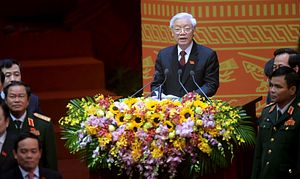A scene from a Cold War spy drama apparently played out in late June in Berlin.
Armed men, allegedly Vietnamese intelligence operatives, kidnapped a certain Trinh Xuan Thanh right in the well-known Tiergarten park in Germany’s capital city. Then, with the help of the Vietnamese Embassy, the man was transferred back to Vietnam, where he was put into the custody of the Ministry of Public Security. Official media later reported that Trinh Xuan Thanh surrendered himself to the police voluntarily.
The brazen operation is what the German foreign ministry publicized on August 2 as its version of what happened, while Vietnamese Ministry of Foreign Affairs spokesperson Le Thi Thu Hang denied the story and claimed that all of this simply did not happen. Thanh himself appeared on Vietnamese state TV later on August 3, saying he turned himself in. Still, the official German statement uses very strong diplomatic language — it proclaims the the Vietnamese intelligence attaché persona non grata and promises serious repercussions to Vietnam-Germany relations if Thanh is not allowed to return back to Germany.
According to German statements and media reports, Thanh’s extradition was discussed on the sidelines of the G20 Summit in Hamburg in early July 2017. Hanoi has posted an international search order for Thanh, who is accused of causing damage of around $145 million to the construction branch of the state-owned oil giant PetroVietnam. However, Berlin was unlikely to heed the Vietnamese call not only because Thanh’s application for asylum was still being processed but also because Germany does not extradite anyone facing the death penalty back at home. That could well be on the table for Thanh.
The fact that the Vietnamese went as far as to conduct a coercive operation on German soil speaks volumes as to how important Trinh Xuan Thanh is for the political situation back at home. The corruption scandal with Thanh at the center started more than a year ago and was used by the Communist Party of Vietnam (CPV) leadership and personally by General Secretary Nguyen Phu Trong to launch a massive anti-corruption campaign. Politically, it resulted in the removal of Dinh La Thang, Ho Chi Minh city Party chief, from the Politburo – an important win for Trong over the remnants of former Prime Minister Nguyen Tan Dung’s patronage networks.
Trong, who retained his post after the 12th CPV Congress in January 2016, is expected to leave mid-term, i.e. in 2018. Many seem to expect his choice for a successor to be Dinh The Huynh, an old-school ideologue, but as Zach Abuza discussed in The Diplomat, there seems to be some opposition to that, at least on behalf of President Tran Dai Quang. Interestingly enough, just last week Vietnamese social media was abuzz discussing Huynh’s alleged absence from important Party meetings due to health issues – rumors certain to have damaged the Trong-Huynh tandem in their bid for power.
Perhaps more damaging to the incumbent leadership in Hanoi was how the latest China-Vietnam clash in the South China Sea played out. Vietnam backed down under Chinese pressure and stopped drilling on Block 136-03, within China’s nine-dash-line. As Bill Hayton reported, one version of the decision-making process in Hanoi claims that the whole Politburo was ready to call China’s bluff, but Trong and Defense Minister Ngo Xuan Lich opted to back down.
Though we still don’t know the whole story, it does look like the Hanoi authorities were in dire need of a quick and big win. The Trinh Xuan Thanh affair had to be brought to an end since he shouldn’t have been able to leave Vietnam in the first place.
What is really surprising is that Vietnam was ready to take this blow to its relations with Germany. The air was electrified even before Thanh’s alleged kidnapping – in late July Germany, along with several other Western states, issued a statement condemning a sentence from a Vietnamese court to opposition blogger Tran Thi Nga. Criticism like this is rarely welcome in Vietnam and remains one of the key obstacles to Hanoi’s strategy of counterbalancing China and its ambitions in the South China Sea.
It seems that this week Vietnam chose domestic power consolidation over keeping up appearances with European partners.
Anton Tsvetov is an expert at the Center for Strategic Research, a Moscow-based think tank. He tweets on Southeast Asian affairs and Russian foreign policy at @antsvetov. The views expressed here are the author’s own and do not reflect those of CSR.
































